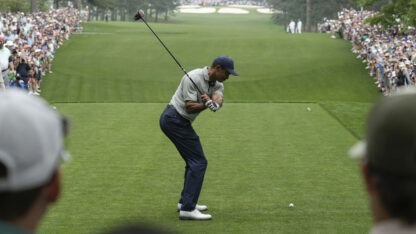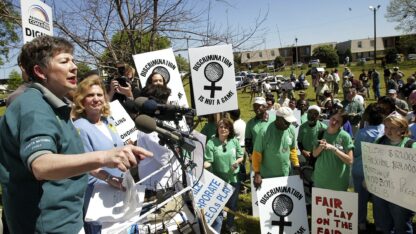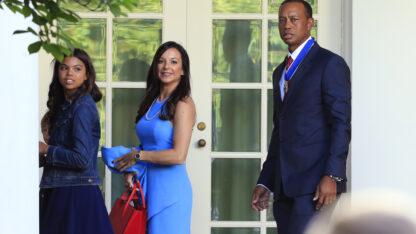By the time Jon Rahm walked up the 18th fairway on Sunday, and made like his late idol Seve Ballesteros with a brilliant par save to finish off the Masters, the fact that the Spaniard would be soon slipping into the green jacket had long been decided.
The most eventful of tournaments had a most uneventful finish.
That was owed to the brilliance of Rahm, who began Sunday four shots back of Brooks Koepka as players arrived early to finish a third round that had been suspended by weather. He cut his deficit two two by the end of the round, pulled ahead on the front nine of the final round, and closed with a 69 for a four-shot victory over Koepka and Phil Mickelson.
“We all dream of things like this as players, and you try to visualize what it’s going to be like and what it’s going to feel like,” said Rahm, who had three rounds in the 60s to finish at 12 under for the championship.
“Never thought I was going to cry by winning a golf tournament,” he said, “but I got very close on that 18th hole.”
In truth, there was plenty to laugh and cry and cringe about during an eventful week at Augusta National.
It began with questions of whether the contingent of 18 players from the Saudi-funded LIV Golf circuit would be able to compete, and how they would be treated both by those they had spurned and those behind the gallery ropes.
Turns out they still have plenty of game.
Koepka set the pace from the moment he tapped in for an opening-round 65 until the final nine on Sunday, when some poor shots and worse luck helped Rahm to overtake him. But there was Mickelson, who in some ways has become the fulcrum of the LIV Golf-PGA Tour divide, finishing with 65 on Sunday to join Koepka in second place.
Patrick Reed made it three LIV Golf players in the top six with his final-round 68, leaving him tied for fourth with Jordan Spieth and Russell Henley. In all, 12 of the 18 made the cut, and they proved that their shorter schedules — they had played just three events this season — and shorter three-round tournaments had not dulled their game one bit.
“It was exciting this tournament rose above it all to have the best players in the world here, and lost all the pettiness,” said the 52-year-old Mickelson, the oldest runner-up in Masters history. “There is always going to be and should always be a place for historical events like this, but it’s OK to have a little bit of different and variety in the game of golf.”
The barbs traded leading up to the Masters — Fred Couples calling Mickelson a “nutbag,” Sergio Garcia ripping the PGA Tour in return — seemed to be forgotten when Jack Nicklaus, Gary Player and Tom Watson hit the ceremonial first shots Thursday.
They certainly became an afterthought when the Masters turned into a test of wills.
That happened late Friday, when hot, humid weather gave way to whipping winds that brought down three pine trees near the 17th tee box, and pounding rain that kept the second round from finishing. The rain continued Saturday, when players returned to the course and tried to get through the third, which likewise was suspended when Augusta National became waterlogged.
In between, some history was made: The 63-year-old Couples became the oldest player to make the cut, and Tiger Woods also made it on the number, matching the record of Couples and Player of 23 consecutive cuts made at the Masters.
Woods withdrew early Sunday when his plantar fasciitis returned, the first time the five-time champion had failed to finish the Masters as a professional. Now, the question is whether he will play the PGA Championship at Oak Hill in just over a month.
Rahm will be there. He suddenly has two legs of the career grand slam in the bag, and needs the PGA and British Open to finish it off. And given the way he played Sunday, Rahm figures to be the favorite just about everywhere.
He trailed Koepka by two when they returned to Augusta National early Sunday to finish their third rounds, and cut the deficit in half almost immediately. The two went shot-for-shot the rest of the round, and the U.S. Open champion at Torrey Pines was still two shots behind Koepka when they started the final round.
Koepka began to collapse, though. The birdies dried up the and bogeys multiplied, and at one point he went 22 straight holes without a birdie. Rahm had no such trouble, seizing the opening to build a lead that nobody could touch.
The lasting image from a memorable Masters came when Rahm walked off the 18th green in the twilight.
On the birthdate of Ballesteros, and the 40th anniversary of his winning a second Masters title, Rahm had one of his own. He embraced his wife and two children, then hugged two-time Masters champion José María Olazábal, who had stuck around to see whether his fellow Spaniard could join him in the most exclusive of company.
“That might have been the hardest thing to control today, is the emotion of knowing what it could be if I were to win,” Rahm said later. “That might have been the hardest thing.”









